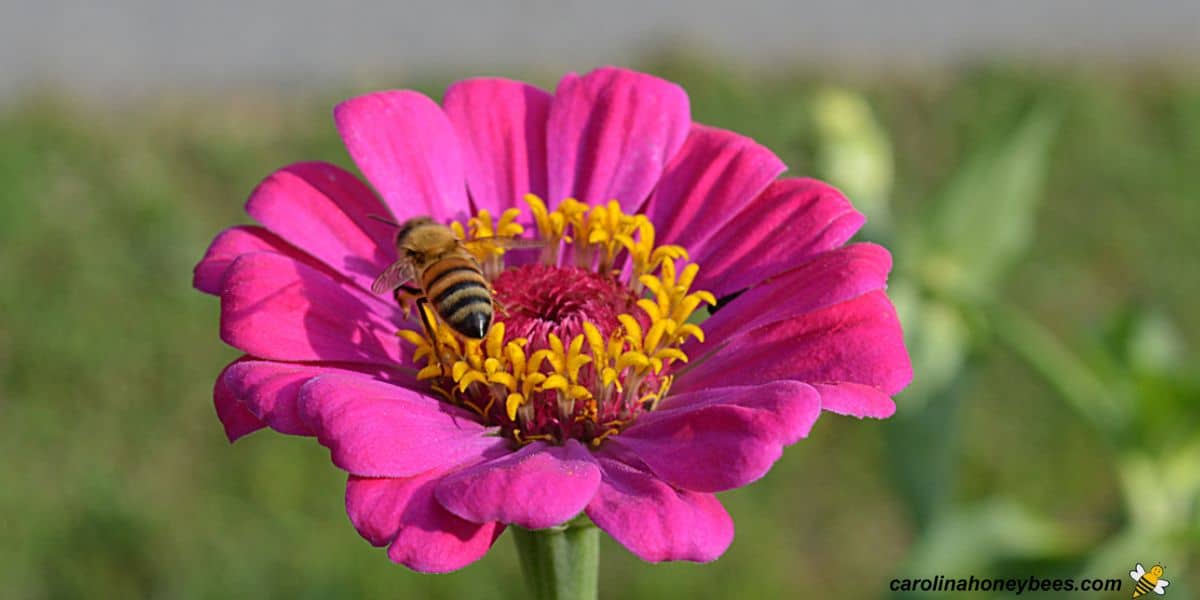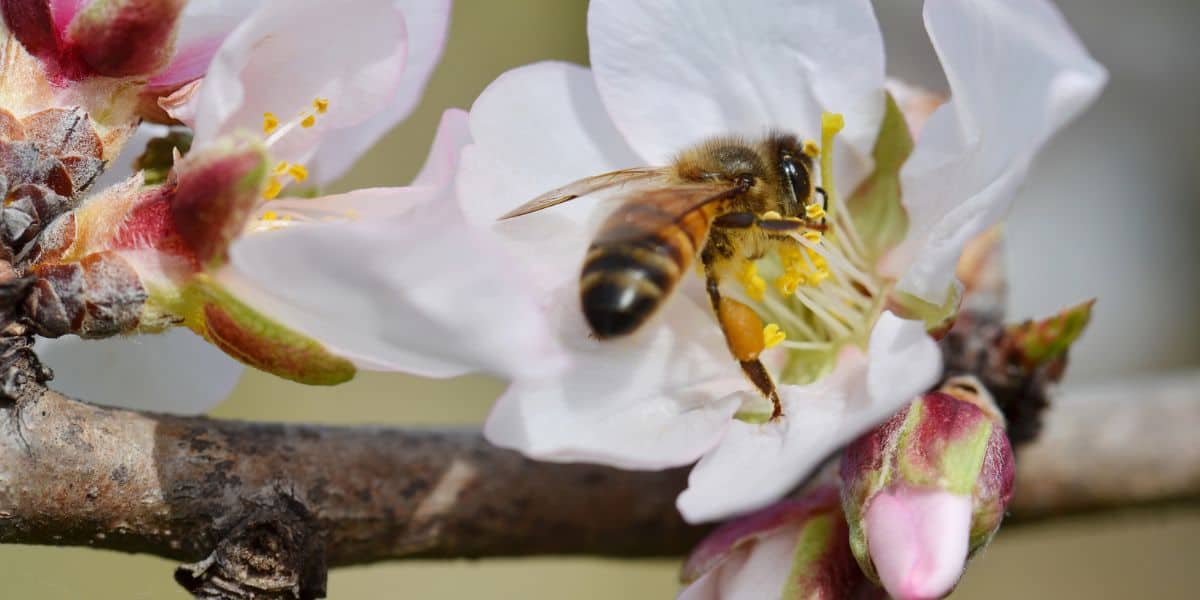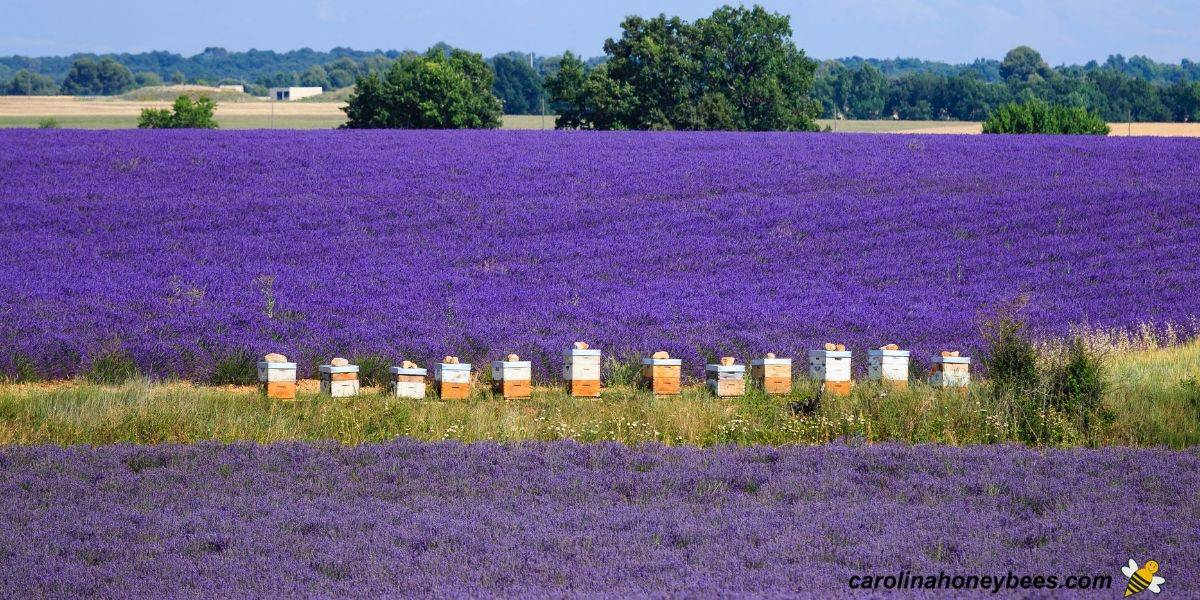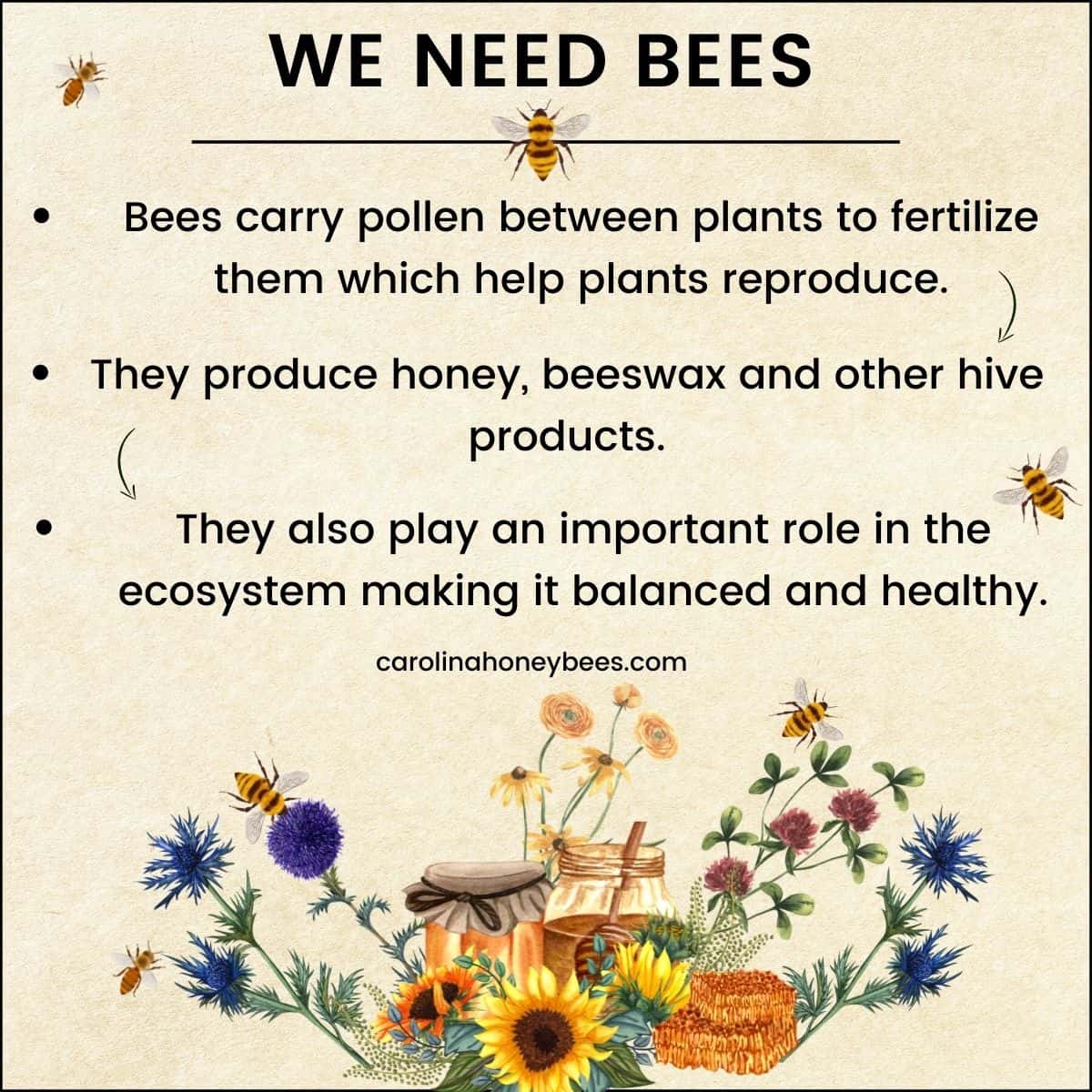Why Bees are Important
Honey bees play a crucial role in our ecosystem and food supply. They are essential pollinators for most of our food crops. While honey bees aren’t the only important pollinators—many other insect species play a crucial role—it’s clear that their survival is key to a healthy environment. In this article, I will share with you some key reasons that bees are important and some actionable tips you can follow to help save our bees.

Any beekeeper, or bee lover, is likely well-versed in common honey bee facts. We amuse ourselves by learning the fascinating things that these tiny insect accomplish. Yet, even we, may not realize the true impact that bees have on our daily lives.
Why Honey Bees Matter
Along with thousands of other bee species, honey bees help support a healthy planet. Along with native bees, such as bumble bees, and many types of solitary bees that live alone, each insect has a role to play.
Their specific role does vary a bit among the species. But, recognize that all bees are important in several areas:
- pollination/agriculture
- ecological role
- biodiversity benefits
- environmental indicators

Pollination & Agricultural Impact
In the United States, modern agriculture practices are based on the idea of specialization – huge fields of a single crop. When a large crop field is in bloom, a huge number of pollinators are needed quickly.
Due to their portability and large families, the importance of honey bees can not be overlooked. Native bees would not exist in large enough numbers to pollinate the fields.

Large honey bee colonies can be moved from field to field as needed. Some beekeepers make a living in migratory beekeeping – trucking colonies to crops in need.
In our agricultural system, honey bee pollination contributes millions of dollars to the food industry each year. This helps farmers increase the yield of their crop fields.
Some of your favorite fruits and vegetables need bees for pollination: apples, strawberries, cucumbers, broccoli, almonds, etc. Prices for these foods would be even higher without bees.

Ecological Role of Honey Bees
Honey bees are insects that serve as essential pollinators because of their design. Yes, they pollinate plants – unintentionally, when they are collecting pollen and nectar.
Pollination is the cornerstone of biodiversity and ecological balance. Of course, many native bees also pollinate the wild plants that produce seeds for wild birds and berries for mice and lizards.
In the food chain, some of these berry eating animals are then consumed by larger beasts – creating an ecological balance.
Biodiversity Benefits
One of the benefits of beekeeping is an increase in plant diversity in your area. Having more bees available to pollinate plants (wild and tended gardens) results in a wider variety of plants and seeds.
This improves the nutrition of all connected life forms and makes more nesting sites available for other insects, birds etc.
Bees as Environmental Indicators
Researchers confirm a sharp decline in many pollinator species in recent years. When an ecosystem is experiencing problems due to pollution, lack of good bee habitats or other problems, a decline in pollinators is one of the first signs of trouble.
Honey bee colonies have been facing serious challenges in recent years. We know that an influx of various pests of honey bees have had a negative affect.
But, what affects honey bees may also affect bumble bees and other native pollinators. This provides an opportunity to analyze current conditions and look for ways to make things better.

Products Derived from Bees
Even the early colonists understood the importance of honey bees. They brought German Black Honey Bees to the New World on ships. That had to be a difficult journey.
Bees were so important to their lives that they would often tell the bees of major life events such as deaths, marriages etc a charming tradition.
The new colonists understood the value of honey bees and wanted the benefits that having their own hives would bring.
- bee pollen
- honey
- beeswax
Raw Bee Pollen
Bees use pollen, gathered from plants, as a protein source use to raise young bee. As pollen is unintentionally moved from plant to plant, pollination occurs. This results in any nearby gardens producing more vegetables and fruits.
However, some people actually consume bee pollen. Its used as a food supplement for humans dating back to the Middle Ages.
Honey Production
Of course, the most popular product from honey bees is honey. Worker bees make honey from plant nectar and store it in the hive to use later.
The honey bee (Apis mellifera) is the only insect in the world that directly produces food for humans. Not only do we consume it – there are hundreds of different uses for honey to explore.
Beeswax
Beeswax is another very valuable hive product. Beeswax is made by adult honey bees and used to create the honeycomb structure inside the hive.
Making beeswax candles is a common practice among beekeepers. However, the uses for beeswax are practically endless. From cosmetics to furniture polish, beeswax is a product that must not be overlooked.
Simple Steps to Help Bees
There are many ways you can help save bees. The collective efforts of many people taking small steps adds up.
- provide food sources and nesting sites
- limit the use of pesticides around your home
- support local beekeepers
- spread the word
Create Bee Gardens
Bees help flowers by providing pollination services for a payment of pollen or nectar. When choosing plants for your patio, yard or garden, choose flowers for honey bees that are well suited to your area.
Insects need water too. Every bee friendly garden should contain a water source – especially if no natural source is nearby.
Creating a water source for bees can be a lot of fun and beautiful too. I grow waterlilies in my water garden and the insects and frogs love it. The bees even gather water from my lotus growing pots.
If you can the space, don’t forget about trees that bees like. They provide shade and food in season.
A small wildflower meadow for bees can be a beautiful addition to your outside area. If you are unable to till the soil, consider some container plantings. Lavender, clovers, mints, coneflowers – all are bee favorite potted plants that do well.

Limit Pesticides
Many researchers express concern over neonicotinoids – the most commonly used insecticides in the world.
We know for a fact that neonicotinoids kill honey bees when they are directly exposed to the dust. While agriculture interests insist that the pesticides are safe to use, the EPA seems slow to act.
Check the label on your lawn care products – know what you are spraying. Or if possible, let those dandelions grow for the bees a few weeks longer – does a few weeds matter?
While I am not saying you can’t have a beautiful grass lawn if you wish – many weeds do feed bees.
If you must use a pesticide, use the least toxic form. Perhaps Fire Ant control is needed. This is the opportunity to use a granular ant killer product. Granular products are generally less toxic to pollinators than dust which may be carried by to the hive.
Support Local Beekeepers
Beekeeping is a wonderful activity but it is not for everyone. If becoming a beginner beekeeper is not a possibility, you can promote pollinators by purchasing honey and other products from local community beekeepers.
If you don’t know any, reach out to local beekeeping associations in your area. Beekeepers are everywhere. Look for one of us at public events proudly wearing a honey bee costume perhaps.
FAQs
Honey bees are the most important pollinators for modern agriculture due to the fact that they live in large families and are easy to move.
Our bees are facing a multitude of problems including: habitat loss, nutritional deficiencies, pollution, changing climates and pesticide exposure.
Most of the major food crops (corn, wheat, rice and soybeans) are wind pollinated. They do not rely on bee pollination.
Hence, the statement that “without bees we will starve” is not as simple as it sounds. No, we would not starve (at least not right away) but we may get tired of eating the same thing. Our diet would certainly be affected.
If we lost all of our bees, we would lose the plants that rely on them for pollination. Then, we might lose the animals that rely on those plants. This causes problems all up the food chain with more problems than we might think.
Bees are responsible for pollinating 1/3 of the foods humans like to eat, they also contribute to ecosystem biodiversity.
Final Thoughts
Bees are important – both native bees and our hard-working honey bees. In recent years, it is clear that they are facing some major struggles. Honey bees are not endangered but some of the challenges facing them also affects other pollinations. Let’s do everything we can to help our pollinators and reap the benefits of a bee-utiful world for years to come.
More Resources:

